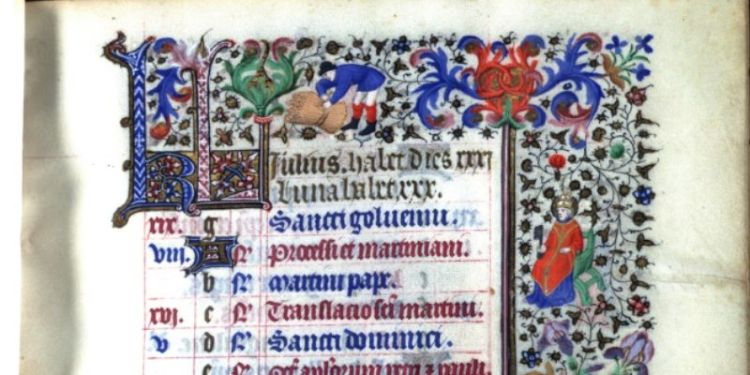Workshop: Digital Medieval Studies Institute

- Date: Friday 11 July 2025, 08:30 – 19:30
- Location: University of Leeds
- Type: Seminars and lectures
- Cost: £140. <a href="https://tinyurl.com/DMSI-2025-UK">Booking required</a>.
A new day-long training and networking event in digital methods for medievalists.
In partnership with the University of Leeds Institute for Medieval Studies, University of Leeds Libraries, and Digital Medievalist, the Digital Medieval Studies Institute (DMSI) presents a full-day programme featuring workshops on digital scholarly methods specifically tailored for medievalists.
The day-long DMSI will introduce participants to a range of digital methodologies currently in use within the field of medieval studies and offer in-depth exploration through one of five workshop offerings. In addition to the workshops, there will be a group meeting at the start, sessions of lightning talks at midday, and an end-of-the-day wrap up session that will provide opportunities for networking with other scholars with shared interests. The primary goal of DMSI is for attendees to gain sufficient training during the one-day event to apply the skills acquired to their ongoing research and teaching in medieval studies. A reception will bring the day to a close.
Programme
08:30-09:00 Arrival and tea/coffee
09:00-09:30 Opening remarks
09:45-11:45 Workshop session 1
12:00-12:30 Lightning session 1
12:30-14:00 Lunch
14:00-14:30 Lightning session 2
14:30-15:00 Tea/coffee
15:00-17:00 Workshop session 1
17:15-17:45 Closing remarks
18:00-19:30 Reception
Workshops
Each participant may choose one of the following workshops:
Geospatial Tools for Mapping the Middle Ages
This workshop considers the use of geospatial data and mapping as they apply to medieval studies. Participants will examine what defines a map, the insights and limitations maps offer, and the challenges of creating maps from medieval sources. Through hands-on activities with open-access tools, including a case study from The La Sfera Project, participants will analyse spatial data and develop their own maps.
Cooperative Network Visualisation with NetCreate
NetCreate is an intuitive network analysis software designed by and for scholars, for use in collaborative research and the classroom. Participants will learn how to build and manipulate networks of actors and their interrelations in NetCreate, as well as how to host and manage NetCreate projects for research partners and dozens of students simultaneously.
Foundations in Working with Medieval Manuscripts using IIIF
This workshop introduces the International Image Interoperability Framework (IIIF), an essential tool for medievalists working with digital manuscript images. Participants will explore key IIIF concepts, create and manage their own IIIF resources, and learn practical applications like creating and sharing annotations and building digital exhibitions. The workshop includes hands-on activities with open source tools and provides six months of extended use of the Digirati IIIF hosting platform utilised during instruction.
Seeing Beyond: Practical and Low-Cost Multispectral Imaging
In addition to an introductory discussion and a demonstration, this workshop offers a hands-on experience using a number of low-cost and accessible multispectral imaging (MSI) systems. During the workshop, participants will explore the MISHA system, developed by the Rochester Institute of Technology, alongside full-spectrum camera solutions, showcasing affordable approaches to recovering the past.
Led by Helen Davies, University of Colorado Colorado Springs.
Artificial Intelligence: Image Analysis Applied to Medieval Manuscripts
This workshop explores how artificial intelligence offers fresh perspectives using the case of semi-standardised production of books of hours in medieval western Europe. Participants will gain hands-on experience with computer-based image analysis to detect and identify miniatures and iconographic motives and cycles. Additionally, they will learn to implement handwritten text recognition and text analysis, uncovering repetitive patterns and unexpected anomalies.
How to attend
This event can only accommodate a limited number of participants and requires an application. Applications are open to everyone, but preference will be given to applicants who demonstrate how they plan to apply what they learn in their research, teaching, or professional practice. Workshops will be filled on a first-come, first-served basis until 1 June 2025, and applicants will be admitted on a rolling basis. Participants may enrol in only one workshop.
The cost of the workshop is £140. Bursaries are available.
For further information, view the application form. The deadline for applications is 1 June 2025.
Organised by N. Kivilcim Yavuz and Laura Morreale.
Image credit
Reproduced with the permission of Special Collections, Leeds University Library, Brotherton Collection, BC MS 1, f. 7r.

